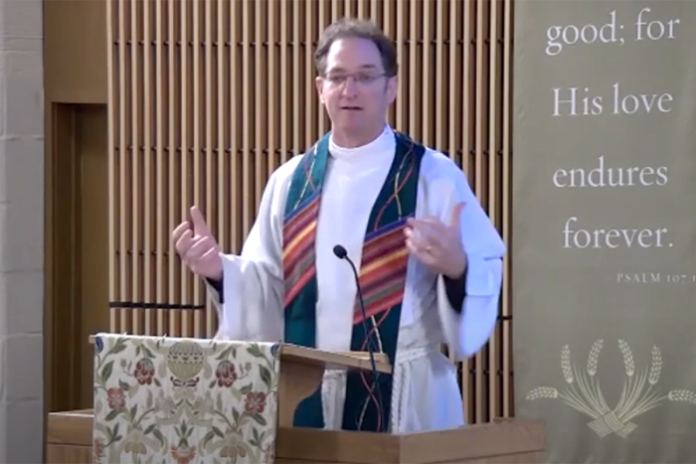Throughout Christian history, periods of social crisis have typically provoked an intensification of the faithful’s belief and practice: more prayer, more Bible reading, more services, more public declarations of the sinner’s faith in Christ. But not for Rev. Cayce Ramey. In June 2021, in the face of what he calls “institutionalized white supremacy,” Ramey decided he would no longer lead Communion services at his Episcopal parish in Alexandria, Virginia, as part of a racial justice fast, according to a November 29 story in the Washington Post.
In May 2024, a diocesan hearing panel largely ruled in favor of the diocese’s argument that Ramey was neglecting a core priestly duty and disregarding “the doctrine, discipline and worship of the church.” On November 25, a Court of Review session heard the priest’s appeal. Ramey, who during the online session spoke in front of a backdrop image of a historic Ghanaian slave castle, argued that refraining from Communion was necessary as long as the church existed in a broken relationship with black community members and other “people of color.”
Ramey began his eucharistic fast after reading Matt. 5:23–24: “If you remember that your brother or sister has something against you, leave your gift there before the altar and go, first be reconciled.” One might say it was the culmination of years of theological training—Ramey has explained that serving at a historically black Episcopal church and taking a course at Howard University’s Divinity School “transformed” his understanding of life outside his “privileged white male heterosexual cisgender existence.” In 2022, the Washington Post spoke glowingly of his role as a co-leader of Good Trouble, Diocese of Virginia, a social justice group that successfully advocated for the creation of a $10 million fund for racial reparations in his diocese.
While awaiting his denomination’s decision on his clerical future, Ramey started Racial Heresy, “a ministry dedicated to undoing the effects of white supremacy in God’s Church.” The website asserts that “just as the Church helped found this country on stolen land and stolen peoples, so must the Church be ever more active in the work of racial justice.”
Whatever legitimacy there may be to ecclesial racial reconciliation or justice initiatives, the case of Rev. Ramey is novel within a movement that has become central to many churches and denominations in the U.S. Ramey’s fast extends far beyond calls for, say, racial reparations or increased engagement between majority-black and majority-white Christian communities. The Washington Post summarized his position: “Racial reconciliation within the church has to take priority over Communion.”
For Catholics, the Eucharist is the “source and summit of the Christian faith,” as Lumen Gentium teaches. Many Protestant traditions have analogous doctrines regarding Communion’s centrality—the Episcopal Church describes it as a “foretaste of the heavenly banquet.” For Ramey and his allies in the Episcopal Church, racial identity supersedes everything the Church does.
Granted, many Episcopalians, including black clergy, oppose Ramey’s Communion fast. “I am insulted and offended that the pain of my people has become a petard, a platform, for someone to deny the Eucharist, the sacramental ministry that we are given as priests,” testified Rev. Gayle Harris, a black assistant bishop in the Diocese of Virginia. Rev. Wendell Gibbs Jr., a retired black bishop of the Diocese of Michigan, said, “I don’t see his indignation as righteous indignation but quite typical of White elitism.”
These protests do not inspire confidence that Ramey’s critics believe the gospel trumps racial identity. Rev. Harris, who in 2018 was forced to publicly apologize for fabricating a story about Israeli soldiers shooting a Palestinian teenager, speaks of “the pain of my people.” Rev. Gibbs criticizes Ramey not preeminently for neglecting the most important sacrament of the Church but for typifying “white elitism,” the very sin Ramey himself abjures.
Read it all in First Things


